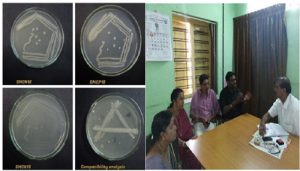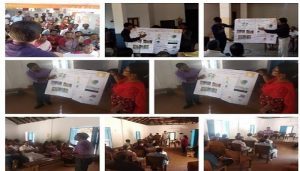


St. Mary’s College (Thrissur, Kerala) has adopted Kuttur, Kottekad, Attore, Pottore, Tirur, Pamboor, Chamakkad, Kunnathu Peedika and Valiyaparambu villages under Unnat Bharat Abhiyan program. The UBA team at St Mary’s headed by Dr. Kayeen Vadakkan and Dr. Meena K Cheruvathur conducted a survey in the villages affected by the recent flood. It was found that the flood washed out the natural soil microbiome in the soil which has further led to a great loss in agricultural revenue. Seeing scenarios, it was proposed by the UBA team that the biotechnological enhancement of flood-affected soil microbiome is possible by the employment of microbial consortium. This will not only balance the microbial ecosystem but will also enrich the soil with conventional soil microorganisms.
Outcome
The UBA team, under the supervision of subject experts, developed a microbial consortium with the ability to fix essential plant nutrients such as Nitrogen, Phosphorus and Potassium. The project was completed in four phases. In the first phase, the SMCNPK18 (the bacterial consortium) was formulated and optimized for its maximum in situ activity. The whole bacterial consortium was cultured and maintained in rice water which is easily available and easy to handle. In the second phase, as a part of the implementation of our technology in Kolazhy panchayat, a detailed discussion was done with local governing bodies to reach out to the public. Mr. Unnikrishnan (President, Kolazhy Panchayat) and all other panchayat members were keen to understand the technology and offered all help from their end. In the third phase, a demonstration of technology implementation was provided to the villagers during the gram sabha meeting. In the final phase, the SMCNPK18 was launched by Adv. V. S Sunil Kumar (Honble Minister of Agriculture, Kerala). After the launch, the consortium was given to the panchayat authorities and distributed to villagers.
Impact

Various isolates were screened for solubilizing capacity and superior strains were selected based on their activity. They were termed as SMCN18, SMCP18, SMCK18. This trio was screened for its compatibility (left); Discussion between St. Mary’s College representatives and Kolazhy Panchayat administrators. (right)

Interaction with the public during the familiarization of technology. Gramasaba meetings were utilized to give orientation to villagers.